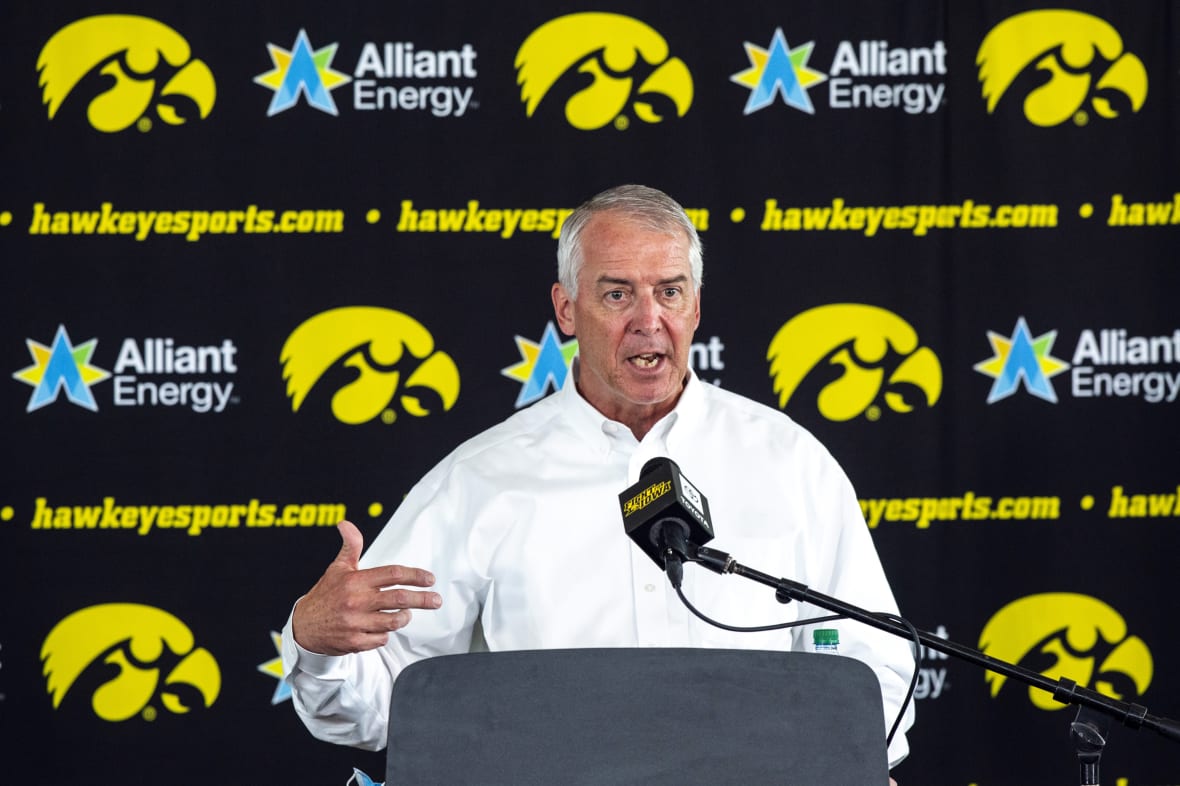Iowa taxpayers will pay $2 million to help the University of Iowa athletic department settle a lawsuit brought by former football players who allege racial discrimination existed in coach Kirk Ferentz’s program, a state board decided in a vote Monday.
The state’s Appeal Board voted 2-1 to approve the use of taxpayer funds for half of the $4.175 million settlement over the objection of State Auditor Rob Sand, a board member who said athletic director Gary Barta should be fired for a series of lawsuits ending in settlements under his watch.

“I can’t imagine a private company that would still have someone at the helm after four discrimination lawsuits under that person’s leadership,” Sand said at a news conference before the vote. “The athletic department, they’ve got the funds for it. The broadcast deal brings tens of millions of dollars every year going forward. I don’t know why they can’t cover their own mistakes and pay for their own mistakes instead of having taxpayer’s do it.”
The lawsuit filed in November 2020 involved former players including former star running back Akrum Wadley and career receptions leader Kevonte Martin-Manley. They alleged they were demeaned with racial slurs, forced to abandon Black hairstyles, fashion and culture to fit the “Iowa Way” promoted by Ferentz, and retaliated against for speaking out.
A message was left for Tulsa-based attorney Damario Solomon-Simmons, who brought the lawsuit on behalf of about a dozen Black former players.
In response to a request for comment from Barta, the athletic department sent a statement attributed to him, saying the department “remains committed to providing an inclusive and welcoming environment for every student-athlete and staff member involved in our program.”
“The Hawkeyes over-arching goal to win every time we compete, graduate every student-athlete that comes to Iowa, and to do it right, remains our focus,” the statement reads.
Barta has been Iowa’s athletic director since 2006. In a statement to the Appeal Board, Sand noted four discrimination cases totaling nearly $7 million in damages under Barta’s watch. The largest of those was $6.5 million to settle a lawsuit in 2017 over the firing of former field hockey coach Tracey Griesbaum. The money used to pay that settlement came from the athletic department, which does not rely on taxpayer funding.
State treasurer Roby Smith and Department of Management director Kraig Paulsen are the other two Appeal Board members.
Paulsen, before voting yes, said it’s not up to the board to play a role in Barta’s employment status.
“We’re here to make a decision as to what’s in the best interest of (Iowa) and it seems to me, upon the recommendation of the Attorney General, this is the wise decision to make,” Paulsen said, according to Des Moines television station KCCI.
Barta, Ferentz, his son and offensive coordinator Brian Ferentz and former strength coach Chris Doyle were dismissed from the lawsuit last week, which signaled that a proposed settlement was imminent.
Kirk Ferentz said in a statement he is “greatly disappointed” in how the matter was resolved. He said negotiations took place between the plaintiffs’ attorney and the Iowa Attorney General’s Office, which represents the university and the state Board of Regents.
“These discussions took place entirely without the knowledge or consent of the coaches who were named in the lawsuit,” Ferentz said. “In fact, the parties originally named disagree with the decision to settle, fully believing that the case would have been dismissed with prejudice before trial.”
Ferentz added that “as part of the settlement, the coaches named were dismissed from the lawsuit and there is no admission of any wrongdoing.”
The agreement calls for $2.85 million to be divided among 12 players and $1.9 million to go to Solomon-Simmons Law for fees and expenses.
In addition, the university would direct $90,000 to support graduate or professional school tuition for the plaintiffs, with no individual receiving more than $20,000, and provide mental health counseling for the plaintiffs through March 15, 2024. The athletic department also is required to hire University of Texas Black studies professor Leonard Moore to oversee a five-year diversity, equity and inclusion plan.
The players initially sought $20 million in damages plus the firings of Barta and the Ferentzes.
Doyle agreed to leave Iowa five months before the lawsuit was filed after widespread accusations that the longtime strength coach used his position to bully and disparage former players, particularly those who are Black. Iowa agreed to pay Doyle $1.1 million in a resignation agreement.
In 2020, before the lawsuit, the university hired the Husch Blackwell law firm to review the program after dozens of former players, most of them Black, spoke out on social media to allege racial disparities and mistreatment. Their activism came as protests against racial injustice swept the nation following the death of George Floyd and after attempts to raise concerns inside the program resulted in only minor changes.
The report said that some of the football program’s rules “perpetuated racial or cultural biases and diminished the value of cultural diversity.”
TheGrio is FREE on your TV via Apple TV, Amazon Fire, Roku, and Android TV. Please download theGrio mobile apps today!
